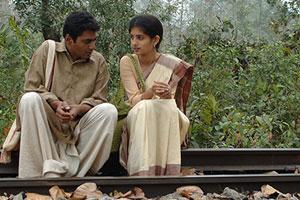 Raja Sen feels Chittagong is an important film despite its shortcomings.
Raja Sen feels Chittagong is an important film despite its shortcomings."Bharat chhod! Bharat chhod!" The fury of the quit-India chant is what stands out the most in Bedabrata Pain's inevitably rousing Chittagong, the words here spat out with profane indignation, diametrically unlike the nearly sing-song "chhodo" request we're acquainted with at school.
"Bha-Rat Chhod" is the cry, mirroring in tone and metric structure that most common of North Indian curses (where Mother stands in for Motherland.) Makes sense. Why would revolutionaries bother with politeness? Or formality?
Surjya Sen -- a schoolteaching freedom fighter known legendarily as MasterDa -- decided in 1930 to storm the British armoury in the Bengali town of Chittagong with a rag-tag but highly trained and motivated band of youngsters.
They held up the armoury, destroyed the telephone and telegraph offices, the act taking the British Government by surprise and striking a powerful blow for the freedom struggle. Remarkably enough, however, Sen's cohorts were mostly aged between 12 and 14.
A historically unique feat that is criminally ignored by most national textbooks, this is not mere cinematic fodder but also a vital story we need to tell, to spread. Ashutosh Gowarikar's Khelein Hum Jee Jaan Se tried to do the same a couple of years ago, and while I found little merit in the craft or the acting of that film in my review at the time, I did however recommend it regardless, for the very reason that the story be heard.
And that perhaps the moral question at its core -- that of underage youngsters being perilously foisted into war --
It is the same with Pain's directorial debut, a sincere and overwhelmingly earnest film that -- while not immediately showing significant directorial craft or filmmaking finesse -- automatically earns some credibility by telling the story with real actors unlike Gowarikar's starry dud.
Talented thespians Manoj Bajpai, Jaideep Ahlawat, Raj Kumar Yadav and Nawazuddin Siddiqui all feature in Chittagong, making it seem a bit like a Wasseypur alumni reunion. The film's leading man, however, is Delzad Hiwale, who plays Jhunku, the gangly and initially-fragile youth who later becomes one of the lynchpins of Sen's revolution. It is through his young, confused eyes that we see the film, and this aids the narrative considerably.
A standout performance for me came from young Vega Tamotia, who shows great spark as Pritilata Waddedar.
The period detailing is frequently sloppy, what with Jhunku's trendy haircut or boys playing football in a muddy field while dressed in dhuti-kurtas elaborate enough for the seventh day of Durga Pujo. It is, as a result, hard to shake the theatricality off, which is Chittagong's biggest problem. Pain's script is a bit too simplistic and makes the film often feel emotionally overwrought, the heavy-handed background score not helping its cause.
So incredible and stunning are the historical facts on their own that they didn't need cinematic theatricality. A dryer, more subtle film built atop these facts -- this unbelievably meaty and patriotic story -- could have been far more effective, perhaps even a masterpiece.
And while Chittagong falls well short of being a great film, it can't help but be an important one. And Pain keeps it honest.
Rediff Rating:












 © 2025
© 2025